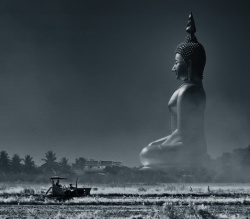Difference between revisions of "Jiriki"
m (Text replacement - "Category:Japanese terminology" to "{{JapaneseTerminology}}") |
|||
| Line 1: | Line 1: | ||
[[File:Statue 02.jpg|thumb|250px|]] | [[File:Statue 02.jpg|thumb|250px|]] | ||
| − | |||
| − | |||
| − | |||
| − | However, the two ways are not to be seen as mutually exclusive, or [[jiriki]] seen as "better" than [[tariki]]. Indeed, a third way does present itself, which sees guidance from a [[teacher]] and [[self]]-practice in [[harmony]]. Eventually, the believer can continue without a [[teacher]] once the ways of practice are learned. Sometimes, each are taken to [[extremes]] and degenerate into practices which are strictly one way or the other. For example, in the attitudes of the [[tariki]] practices mentioned above in which it is believed that no other [[effort]] is required of the believer to attain the [[ultimate]]. | + | |
| + | [[Jiriki]] ([[自力]]?, [[one's own strength]]) - here: the [[Japanese]] [[Buddhist]] term for [[self power]], the ability to achieve [[liberation]] or [[enlightenment]] (in other words, to reach [[nirvana]]) through one's [[own]] efforts. [[Jiriki]] and [[tariki]] ([[他力]] meaning "[[other power]]", "[[outside help]]") are two terms in [[Japanese]] [[Buddhist]] schools that classify how one becomes [[spiritually]] [[enlightened]]. In [[Pure Land Buddhism]], [[tariki]] often refers to the [[power]] of [[Amitābha Buddha]]. | ||
| + | |||
| + | These two terms describe the [[strands]] of practice that followers of every [[religion]] throughout the [[world]] develop. In most [[religions]] you can find popular {{Wiki|expressions}} of [[faith]] which rely on the {{Wiki|worship}} of external [[powers]] such as a preacher in a mega-church or an [[idol]] of some kind that is expected to bestow favor after [[being]] given [[offerings]] of [[faith]] from a believer. Some believers of [[Pure Land]] [[Buddhism]] accept that merely [[chanting]] the [[name]] of [[Amitabha]] [[Buddha]] will lead the believer to [[enlightenment]], as some [[Western]] [[Christians]] believe that by merely asking {{Wiki|Jesus}} to cleanse one's [[sins]] will lead to the [[attainment]] of such a [[desire]]. These are examples of [[tariki]], reliance on a [[power]] outside of oneself for {{Wiki|salvation}}. | ||
| + | |||
| + | [[Jiriki]] is experiencing [[truth]] for oneself and not merely accepting the testimony of another. An example of [[jiriki]] in [[Buddhism]] is the practice of [[meditation]]. In [[meditation]], one observes the [[body]] (most often in the [[form]] of following the [[breath]]) and [[mind]] to directly [[experience]] the {{Wiki|principles}} of [[impermanence]] and [[interdependence]] (or "[[emptiness]]") of all [[phenomena]]. Such {{Wiki|principles}} are formally discussed in the [[Buddhist]] [[scriptures]], but [[jiriki]] implies experiencing them for oneself. | ||
| + | |||
| + | However, the two ways are not to be seen as mutually exclusive, or [[jiriki]] seen as "better" than [[tariki]]. Indeed, a third way does {{Wiki|present}} itself, which sees guidance from a [[teacher]] and [[self]]-practice in [[harmony]]. Eventually, the believer can continue without a [[teacher]] once the ways of practice are learned. Sometimes, each are taken to [[extremes]] and degenerate into practices which are strictly one way or the other. For example, in the attitudes of the [[tariki]] practices mentioned above in which it is believed that no other [[effort]] is required of the believer to attain the [[ultimate]]. | ||
{{W}} | {{W}} | ||
Latest revision as of 05:05, 19 November 2020
Jiriki (自力?, one's own strength) - here: the Japanese Buddhist term for self power, the ability to achieve liberation or enlightenment (in other words, to reach nirvana) through one's own efforts. Jiriki and tariki (他力 meaning "other power", "outside help") are two terms in Japanese Buddhist schools that classify how one becomes spiritually enlightened. In Pure Land Buddhism, tariki often refers to the power of Amitābha Buddha.
These two terms describe the strands of practice that followers of every religion throughout the world develop. In most religions you can find popular expressions of faith which rely on the worship of external powers such as a preacher in a mega-church or an idol of some kind that is expected to bestow favor after being given offerings of faith from a believer. Some believers of Pure Land Buddhism accept that merely chanting the name of Amitabha Buddha will lead the believer to enlightenment, as some Western Christians believe that by merely asking Jesus to cleanse one's sins will lead to the attainment of such a desire. These are examples of tariki, reliance on a power outside of oneself for salvation.
Jiriki is experiencing truth for oneself and not merely accepting the testimony of another. An example of jiriki in Buddhism is the practice of meditation. In meditation, one observes the body (most often in the form of following the breath) and mind to directly experience the principles of impermanence and interdependence (or "emptiness") of all phenomena. Such principles are formally discussed in the Buddhist scriptures, but jiriki implies experiencing them for oneself.
However, the two ways are not to be seen as mutually exclusive, or jiriki seen as "better" than tariki. Indeed, a third way does present itself, which sees guidance from a teacher and self-practice in harmony. Eventually, the believer can continue without a teacher once the ways of practice are learned. Sometimes, each are taken to extremes and degenerate into practices which are strictly one way or the other. For example, in the attitudes of the tariki practices mentioned above in which it is believed that no other effort is required of the believer to attain the ultimate.
